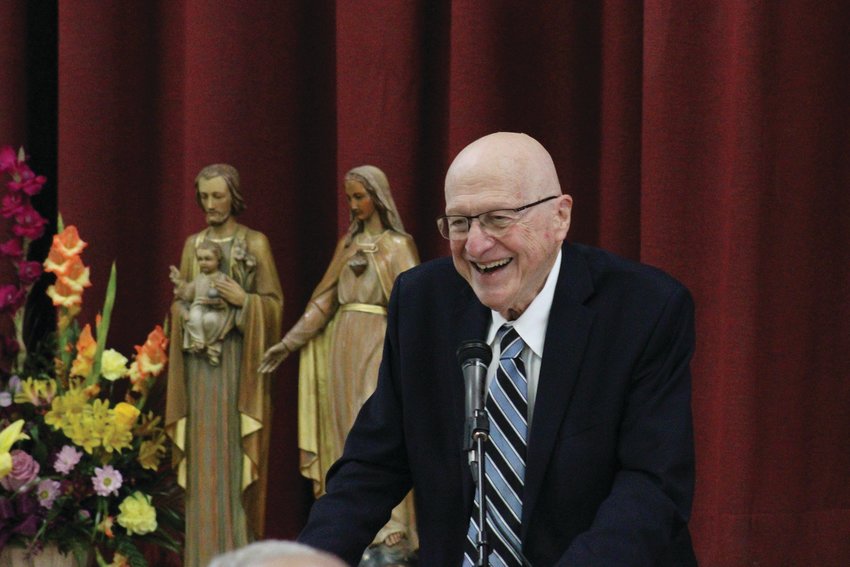 |
| Philosopher Peter Kreeft, a man on a mission -- to teach the truth! |
I'm always a little puzzled by those who say they never read fiction and consider it a waste of time. I think I've found just as much (or more) food for meditation in a great novel than many books of non-fiction and their didactic manner of teaching the same thing. Am I more likely to remember the lessons about good and evil, friendship and treachery, courage and cowardice from a book of psychology or from Tolkien's Lord of the Rings or Shakespeare's Macbeth?
Philosopher Peter Kreeft describes the purpose of literature as to please and to instruct. His presentation on Lost in the Cosmos, Abolition of Man and several other books is tremendous and well worth a listen -- or two -- or even three. He demonstrates how literature can be either direct or indirect to make a point and teach a lesson. Abolition is an example of direct literature, Lost indirect. Lewis uses logic and reasoning; Percy uses satire, irony, and humor. But both works explain the crisis of modern man, men without chests, that is men who have lost the heart of things.
Both fiction and non-fiction are valuable as teaching tools, one more subtle than the other. Great non-fiction like Chesterton's Everlasting Man or St. Augustine's Confessions are powerful examples of non-fiction literature that can change lives. And they have, sparking conversion of atheists into Christian believers. Dante's Inferno, Robert Hugh Benson's Lord of the World, and even children's literature like Lewis' Narnia chronicles have their own power to touch hearts and minds and spark conversion.
Great literature, both fiction and non-fiction, invites meditation and reflection. How many times I recall stopping to think more deeply about a scene in a novel or a biography or a chapter about one of the deadly sins written by a saint or theologian.
Milton's description of Satan's fall into hell offers a severe warning to those imitating the angel's arrogance and pride every bit as much as reading about the experience of an exorcist. Oscar Wilde's The Picture of Dorian Grey or Marlowe's Dr. Faustus offer chilling reminders of the wages of sin. Do their visual horrors inspire any less fear than a treatise on mortal sin?
Kreeft believes six books can save western civilization -- five non-fiction and one fiction:
Lost in the Cosmos by Walker Percy
The Abolition of Man by C.S. Lewis
Mere Christianity by C.S. Lewis
The Everlasting Man by G.K. Chesterton
Orthodoxy by G.K. Chesterton
The first two he considers preconditions for the other four. Lost in the Cosmos: the LastSelf Help Book teaches indirectly with humor how man has lost himself in the modern world, how he has put his reliance on men rather than on God and filled his life with trivia and nonsense. The Abolition of Man makes the point directly and explicitly. Both books describe the same thing: modern man's alienation from himself.Brave New World by Aldous Huxley
Modern man, "who thinks he's with it, is out of it." says Kreeft. Percy "stands us on our heads" so we can gain a right perspective in a topsy-turvy world. Chesterton does the same thing in several of his novels and essays. Lewis describes "men without chests" who have lost their hearts and become like computers on legs.
I'm reading and laughing over Lost in the Cosmos right now, the first-time reading it. My husband keeps asking me why I'm laughing. Because it's hilarious! I've read the other five books already, but look forward to re-reading them in the context of their impact on Western civilization, Kreeft's point.One of Kreeft's funniest descriptions during his talk is assigning Lost to his college students without any prior explanation. They all took it seriously as a real self-help book and totally missed the humor and irony of the work. The audience laughed when Kreeft said he thought about sending the results to Percy, but the author was ill at the time and might become sunk in depression.
Missing the point also happened with Jonathan Swift's Modern Proposal when he satirized and exposed the evil of the English government ignoring (and even contributing to) the Irish famine. Swift's suggestion that the Irish eat their babies was taken seriously by many who were outraged. Did they help the starving Irish because of it? I don't know enough Irish history to offer an answer, although I do know that America sent boatloads of aid to Ireland because my husband's reading a book about it. Literature definitely can have an impact on both thoughts and actions!
I find Peter Kreeft's list of six essential books to save Western civilization interesting. He obviously thinks highly of Chesterton and Lewis. So do I. Perhaps you have book suggestions of your own. What books do you think could help replace the missing hearts of modern man and move him toward conversion, something our world desperately needs.


No comments:
Post a Comment